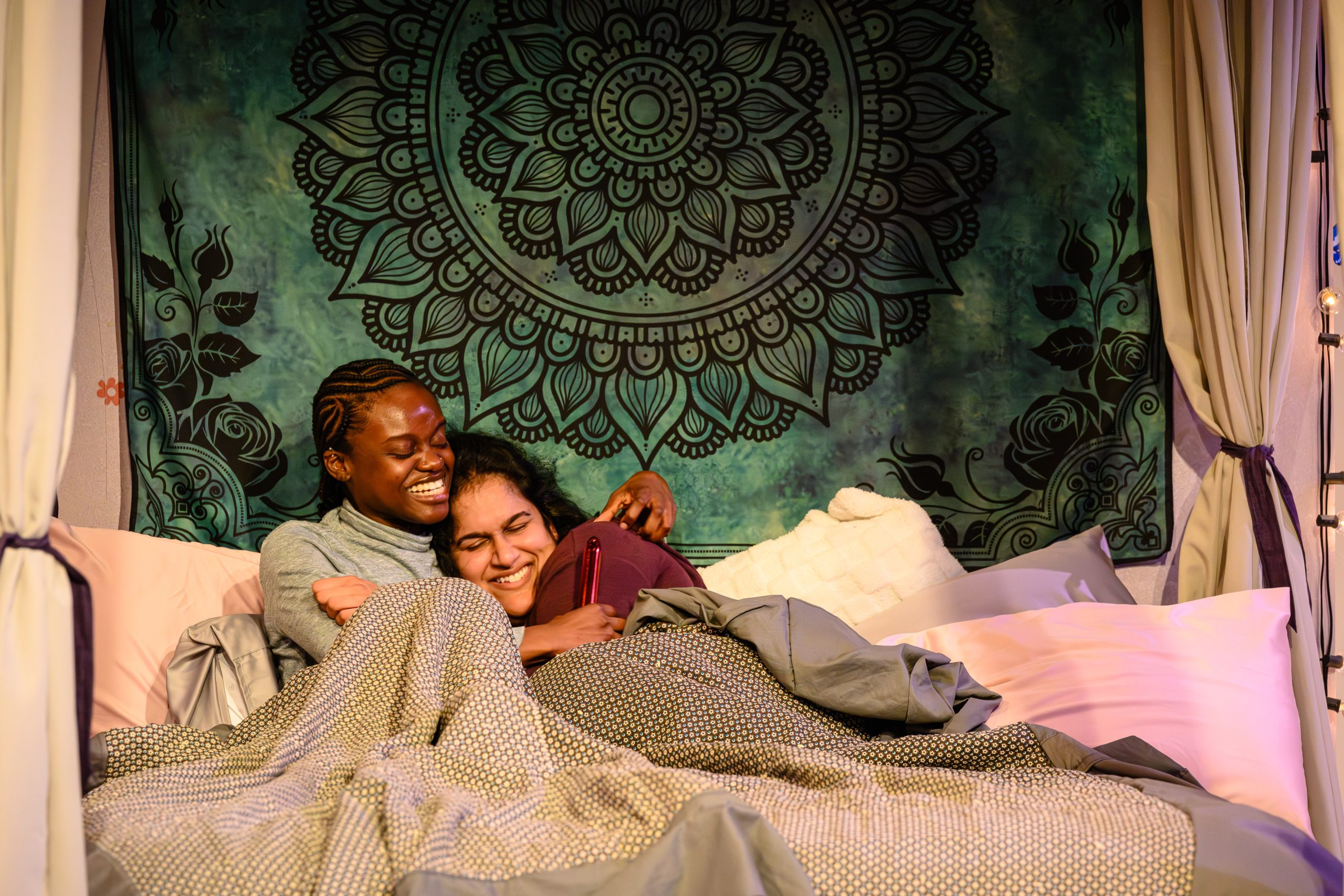By Sheila Regan
Copyright minnpost

There’s a scene in the play “Maybe You Could Love Me,” a fraught romance between two young Muslim women, where one of the characters, Noor, reveals to the other, Sajida, that despite their intimate relationship, she plans to marry a man. Sajida offers a counterproposal: “Maybe you could love me,” she says. Noor’s response is not what Sajida hopes for. “No,” she says. “That’s gross.”
The exchange captures a central question in Theater Mu’s world premiere by L.A.-based playwright Samah Meghjee: How can queer love flourish in a community that doesn’t condone it?
The play, which follows its heroines from childhood through young adulthood, offers elements of comedy and drama, handled deftly by director Katie Bradley. It’s brought to life by Broadway veteran Sushma Saha, as Sajida, and the jaw-droppingly good Ashembaga Jaafaru, as Noor. The result is an excellent theatrical experience.
In the earliest scenes, Noor is 8 and Sajida is turning 9 — the age when she begins to wear a hijab. The show picks up again nine years later, by which point the friends have developed a sexual relationship and face choices about their futures. Finally, in their mid-20s, the women grapple with the consequences of their choices.
Bradley shows a keen sense of subtle comedy throughout the show, alongside nuanced emotional interplay between the characters across time. Unfortunately, that work gets lost at times in cumbersome scene changes.
Scenic designer Mina Kinukawa, costume designer Sarah Bahr, and prop designers Kenji Shoemaker and Sarah Harris crafted meticulous representations of the three time periods, but multiple set and costume changes slow the momentum of the storytelling. The details are interesting, but the designs could have been simplified to speed the pace.
Related: Theater Mu’s new artistic director is bringing a diverse set of skills to Minneapolis
As the show progresses, Sajida and Noor reveal their own struggles to balance faith and societal rules with personal desires and identity. Sajida establishes herself early on as the more religious of the two friends, talking about ideas that are haram, or forbidden, as early as her ninth birthday. As a teenager, she attempts to break things off with Noor as the guilt of their sexual relationship weighs on her.
Noor, meanwhile, has a looser conception of the rules and bends them freely when it suits her. As a child, she’s funny, confident and full of tricks, and Jaafaru plays her with endearing impishness. Playing Noor as a teen, she brings wonderful comic timing and incredible facial expressiveness to the role.
The strongest scenes come when the characters are children. Meghjee’s script mines the girls’ complexities fearlessly as they navigate their relationship to culture and with each other. Their emotions run high, their identities begin to take shape and their friendship becomes central.
As teenagers in a sexual relationship, the young women reach an impasse. Despite Noor’s willingness to bend the rules when it pleases her, ultimately she cares too deeply about public appearances and cultural norms. She cannot conceive, for instance, of going away to college or pursuing a career. Her path includes marriage, children and staying at home, in contrast to Sajida’s dreams of scholarships and a future in the arts.
I struggled the most with the characters’ adult scenes. While Noor has married and Sajida has gone on to become a successful curator, they’ve continued a friends-with-benefits relationship. Meghjee introduces a plot twist that sidelines the characters’ ability to resolve their impasse, which feels like an unfortunate deflection from the play’s central conflict: one character who wants to continue the relationship in secret and another who refuses to hide.
After the climax, Meghjee returns to a scene when Noor and Sajida are children. The move works well artistically, giving the play a circular structure. But I left the theater frustrated, not knowing what happens next in the adult storyline.
Related: ‘Secret Warriors’ brings to light work of Japanese-American soldiers during WWII
Still, I walked away with plenty to think and talk about — in the lobby and later at home. That’s a good sign. The play brings up complex questions about identity, love and how to live one’s truth – all handled with humor and tenacity. Thanks to Bradley’s sensitive direction and Jaafaru’s revelatory performance, “Maybe You Could Love Me” sparkles. Theater Mu continues to take risks on new voices, and Meghjee stands out as a playwright worth watching.
“Maybe You Could Love Me” runs Tuesdays through Saturdays, Sept. 16-27, at 7:30 p.m., with no show on Tues., Sept. 23. Sunday performances on Sept. 21 and 28 are at 2 p.m. There is an additional 2 p.m. performance on Sat., Sept. 27. Mixed Blood Theater, 1501 S. 4th St., Minneapolis. $10-$60 with pay-as-you-are options. Find more information here.



